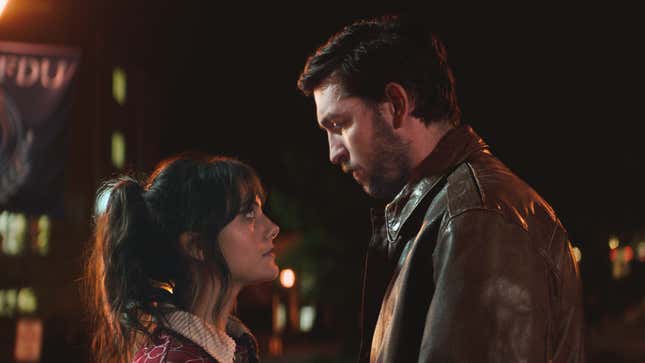
This story contains spoilers for the entirety of the movie Cat Person.
If you haven’t read Kristen Roupenian’s short story “Cat Person,” you’ve almost certainly heard about it. Published in The New Yorker in late 2017, the story follows Margot, a 20-year-old college student who begins a text message flirtation with the 30-something Robert. They eventually have unsatisfying sex, and when she texts him to break it off, he becomes increasingly upset and unhinged, and the story ends with a single-word message he sends her: “Whore.”
Roupenian’s short story is a solid piece of work, and it certainly hit at the right time. The last few months of 2017 saw a public reckoning on the behavior of powerful men—sparked in large part by reporting about Harvey Weinstein in The New York Times and by The New Yorker’s own exposé on him—and the mainstreaming of the #MeToo movement. “Cat Person” is part of this conversation, but is instead concerned with the ways power is wielded on a smaller scale. The story immediately spawned Twitter discourse and think pieces galore. A screen adaptation was inevitable.
And now, it’s here. Starring Emilia Jones and Nicholas Braun, Cat Person premiered earlier this year at Sundance and recently opened in theaters. The film takes significant liberties with its source material—which, in and of itself, isn’t a problem. To stretch some 7,200 words into a two-hour film requires changes and additions. Some of them make sense, like making Margot’s roommate Tamara (renamed in the film as Taylor) into more of a character. The addition of Margot’s other friends, who are starring in a production of Into The Woods and won’t stop singing, are fun and, unfortunately, relatable. Some of the tweaks are needless, like changing Margot’s ex-boyfriend from coming out as non-binary to coming out as asexual. But most of them are flatly insane.
In the story, Margot texts Robert while visiting her mother and stepfather for a college break. In the film, it’s also her stepdad’s 60th birthday, and her mother insists the two of them perform “My Heart Belongs To Daddy” for him in front of the other guests for some reason. “Marilyn Monroe sang it!” Margot’s mother says to counter her protestations, apparently unaware that Julie London’s rendition of the song is far superior.
Isabella Rossellini is also here as Margot’s professor, Dr. Enid Zabala, who has been cultivating an ant colony for 17 years. “She still has her wings. That means she’s still a virgin,” she says of the colony’s queen in a way that sounds like it will be significant later but isn’t. Other great quotes from this character include “People choose to be scared” and “These are very precious bones,” the latter referring to a shipment of precious bones Zabala receives in the mail. This character and environment mostly serve to give Margot and Robert a new rendezvous location before their actual sexual encounter, where they accidentally destroy Dr. Zabala’s ant colony. This was also mostly unnecessary, but mostly fun.
But all of this is merely a warm-up act for the film’s biggest stroke—whether it’s a stroke of genius, madness, or a legitimate medical emergency is unclear. The short story ends with Robert’s epithet, revealing his true character, but in this film, there are still 40 minutes to go. For better or worse, Cat Person uses these very precious minutes to go completely off the rails. Margot sees Robert standing outside the movie theater where she works and believes he’s stalking her. The police can’t really do anything, so she resolves to attach a tracker to his car so she can know where he is.
She breaks into his house armed with mace. He catches her, they get into a scuffle where she accidentally maces herself in the face. Robert then won’t let her leave because he’s convinced anyone who sees her in this condition will blame him. They get into a full-blown physical brawl, where they tumble into the basement and accidentally light the house on fire, setting the stairs ablaze and trapping themselves. They huddle together in a bulkhead and survive. Then Robert moves “to the coast” and is never heard from again.
By the time the credits are rolling, we have completely left not just the realm of the short story, but reality. On this level, Cat Person is a complete betrayal of its source material, a relatively understated exploration of heterosexual power dynamics. But as a standalone film? It’s kind of remarkable, perhaps the best entry into the “so bad it’s good” canon in recent memory. This is probably the best-case scenario for a movie whose raison d’être is internet discourse. Perhaps in its own backdoor way, Cat Person does highlight how ridiculous this kind of drama really is.